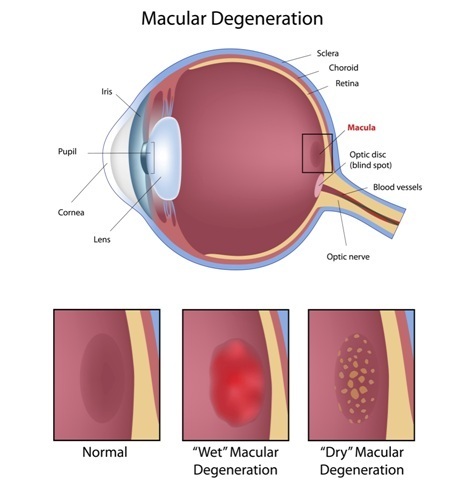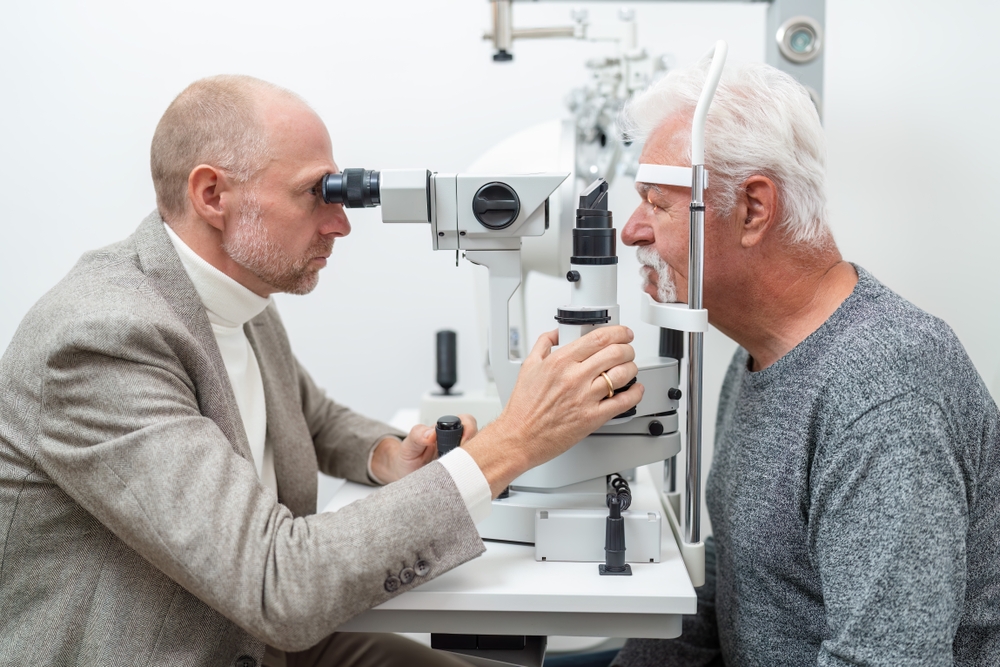
You need to be aware of several age-related eye conditions as you age. Eye conditions often go unnoticed because their symptoms are usually subtle at first.
One of the more common conditions is age-related macular degeneration or AMD. It also has subtle early symptoms, making spotting early warning signs more challenging.
However, there are some things you can look out for. More importantly, your ophthalmologist can diagnose and detect early signs of age-related macular degeneration during an eye exam.
Eye exams are the best way to diagnose age-related macular degeneration before experiencing vision loss. Keep reading to discover if age-related macular degeneration has warning signs and what it could mean for your vision!
What is Macular Degeneration?

Macular degeneration is an eye condition that causes damage to the center of the retina, called the macula. The retina is the thin membrane that lines the back of your eye.
It contains photoreceptors that translate the light that passes through your eye into information it sends to your brain. When the macula becomes damaged, it kills these photoreceptors, which cannot regenerate.
Eventually, this affects your central vision. It is often called age-related macular degeneration because it primarily affects patients 50 and older.
Your risk of developing the eye condition increases significantly with age. There are two kinds of age-related macular degeneration: dry and wet.
Dry Age-Related Macular Degeneration
Dry is the most common of the two forms of age-related macular degeneration. As you age, it occurs slowly over time, and yellowish deposits called drusen form under the macula.
As drusen forms under the macula, it causes the macula to become thinner, leading to its degeneration.
Wet Age-Related Macular Degeneration
Wet age-related macular degeneration is far rarer than the dry form. However, it can progress much more quickly.
It occurs when blood vessels under the macula grow abnormally, causing swelling and leaking, damaging the macula as scar tissue forms.
What are the Symptoms of Age-Related Macular Degeneration?
Symptoms of age-related macular degeneration are similar, no matter which form you develop. The primary symptom of the eye condition is loss of central vision.
There are a few ways to spot the earliest signs of central vision loss. These subtle symptoms include:

- Straight lines appear wavy
- You have more trouble reading
- You find it more difficult to recognize familiar faces
As age-related macular degeneration continues to develop, you’ll continue to lose more central vision. Although it’s rare and difficult to go completely blind due to age-related macular degeneration, it can still cause significant vision loss.
If you have dry age-related macular degeneration, vision loss can occur slowly over time. Still, it can also turn into the wet form of the eye condition and accelerate damage.
Any vision loss due to age-related macular degeneration is permanent and irreversible. For this reason, it’s crucial to have both wet and dry forms of age-related macular degeneration diagnosed early for monitoring and treatment.
Diagnosing Age-Related Macular Degeneration
Although the early symptoms of age-related macular degeneration can be subtle and more challenging to ascertain, the signs are much more apparent with an eye exam. During an eye exam, your doctor can examine your eye and see your macula.
If you have age-related macular degeneration, they can spot any warning signs of the eye condition. One of the most significant warning signs is seeing a buildup of drusen.

A buildup of drusen on the macula can occur before you develop age-related macular degeneration. An early diagnosis of age-related macular degeneration is the best way to prevent complete vision loss.
Because diagnosing age-related macular degeneration before symptoms occur is the best-case scenario, you must regularly schedule eye exams with your ophthalmologist at St. Luke’s at The Villages. Eye exams are crucial once you turn 40 and become more important the older you get.
By age 55, you should have eye exams at least once a year. Annual exams ensure that eye conditions like age-related macular degeneration are caught promptly and that any age-related eye conditions are diagnosed and treated promptly.
Regularly scheduling eye exams can save your vision from several different eye conditions.
Treating Age-Related Macular Degeneration
Unfortunately, there is no treatment for dry age-related macular degeneration. There are, however, certain nutritional supplements your eye doctor may recommend to lower your risk for dry age-related macular degeneration that can also slow the progress of the condition if you develop it.
You can also lower your risk by leading a healthy lifestyle. A high-fat diet, high cholesterol, and high blood pressure all put you at higher risk for developing age-related macular degeneration.
But even if you have dry age-related macular degeneration, it’s necessary to receive the earliest diagnosis possible to monitor the condition and its progression. Dry age-related macular degeneration can turn into the wet form, which causes faster vision loss but is also treatable.
There is no cure for wet age-related macular degeneration, but it can be managed and controlled to slow and prevent further vision loss. The primary treatment option is anti-VEGF injections.
The injections contain a formula inhibiting blood vessel growth triggered by a VEGF protein. By having these injections regularly, you can keep your blood vessel growth under control and even decrease the amount of blood vessels already grown under the macula.
Laser treatments can also seal off leaking blood vessels in more severe wet age-related macular degeneration cases. Whether you have the wet or dry form of age-related macular degeneration, the best way to preserve your vision is to have eye exams and know how to recognize the early signs of the eye conditions.
Do you think you may have age-related macular degeneration? Schedule an appointment at St. Luke’s at The Villages in Lake Sumter Landing, FL, to learn more.









